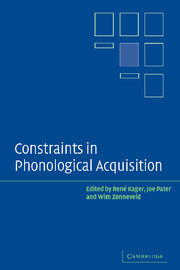Book contents
- Frontmatter
- Contents
- List of contributors
- Abbreviations
- Preface
- 1 Introduction: constraints in phonological acquisition
- 2 Saving the baby: making sure that old data survive new theories
- 3 Markedness and faithfulness constraints in child phonology
- 4 Input elaboration, head faithfulness, and evidence for representation in the acquisition of left-edge clusters in West Germanic
- 5 Phonological acquisition in Optimality Theory: the early stages
- 6 Syllable types in cross-linguistic and developmental grammars
- 7 Bridging the gap between receptive and productive development with minimally violable constraints
- 8 Learning phonotactic distributions
- 9 Emergence of Universal Grammar in foreign word adaptations
- 10 The initial and final states: theoretical implications and experimental explorations of Richness of the Base
- 11 Child word stress competence: an experimental approach
- Index of subjects
- Index of names
10 - The initial and final states: theoretical implications and experimental explorations of Richness of the Base
Published online by Cambridge University Press: 22 September 2009
- Frontmatter
- Contents
- List of contributors
- Abbreviations
- Preface
- 1 Introduction: constraints in phonological acquisition
- 2 Saving the baby: making sure that old data survive new theories
- 3 Markedness and faithfulness constraints in child phonology
- 4 Input elaboration, head faithfulness, and evidence for representation in the acquisition of left-edge clusters in West Germanic
- 5 Phonological acquisition in Optimality Theory: the early stages
- 6 Syllable types in cross-linguistic and developmental grammars
- 7 Bridging the gap between receptive and productive development with minimally violable constraints
- 8 Learning phonotactic distributions
- 9 Emergence of Universal Grammar in foreign word adaptations
- 10 The initial and final states: theoretical implications and experimental explorations of Richness of the Base
- 11 Child word stress competence: an experimental approach
- Index of subjects
- Index of names
Summary
In this chapter we present the initial stages of work that attempts to assess the ‘psychological reality’ of one of the more subtle grammatical principles of Optimality Theory (OT; Prince and Smolensky 1993), Richness of the Base. Within the OT competence theory, we develop several of this principle's empirical predictions concerning the grammar's final state (section 1) and initial state (section 2). We also formulate linking hypotheses which allow these predictions concerning competence to yield predictions addressing performance. We then report and discuss the results of experimental work testing these performance predictions with respect to linguistic processing in infants (section 3) and adults (section 4).
Introduction
Optimality Theory (henceforth OT) is a highly output-oriented grammatical theory. The strongest hypothesis is that all systematic, language-particular patterns are the result of output constraints – that there is no other locus from which such patterns can derive. In particular, the input is not such a locus. Thus, for example, the fact that English words never begin with the velar nasal ŋ cannot derive from a restriction on the English lexicon barring ŋ-initial morphemes. Rather, it must be the case that the English grammar forces all its outputs to obey the prohibition on initial ŋ. This requirement amounts to a counterfactual: even if there were an ŋ-initial lexical entry in English, providing an ŋ-initial input, the corresponding output of the English grammar would not be ŋ-initial.
- Type
- Chapter
- Information
- Constraints in Phonological Acquisition , pp. 321 - 368Publisher: Cambridge University PressPrint publication year: 2004
- 19
- Cited by



